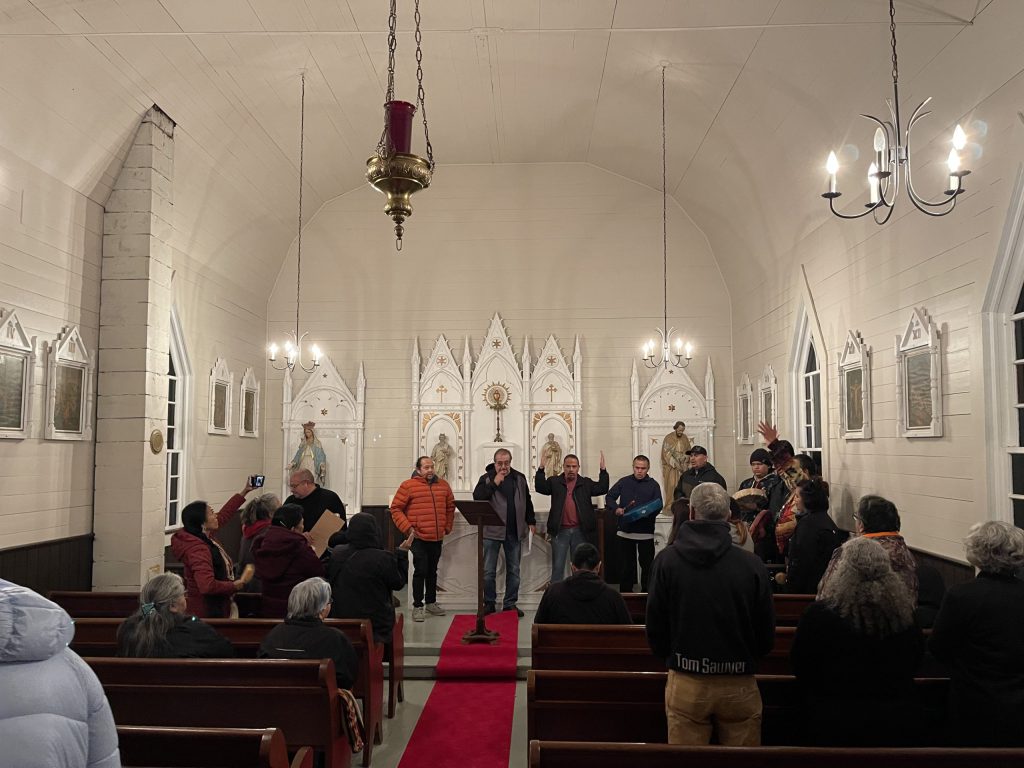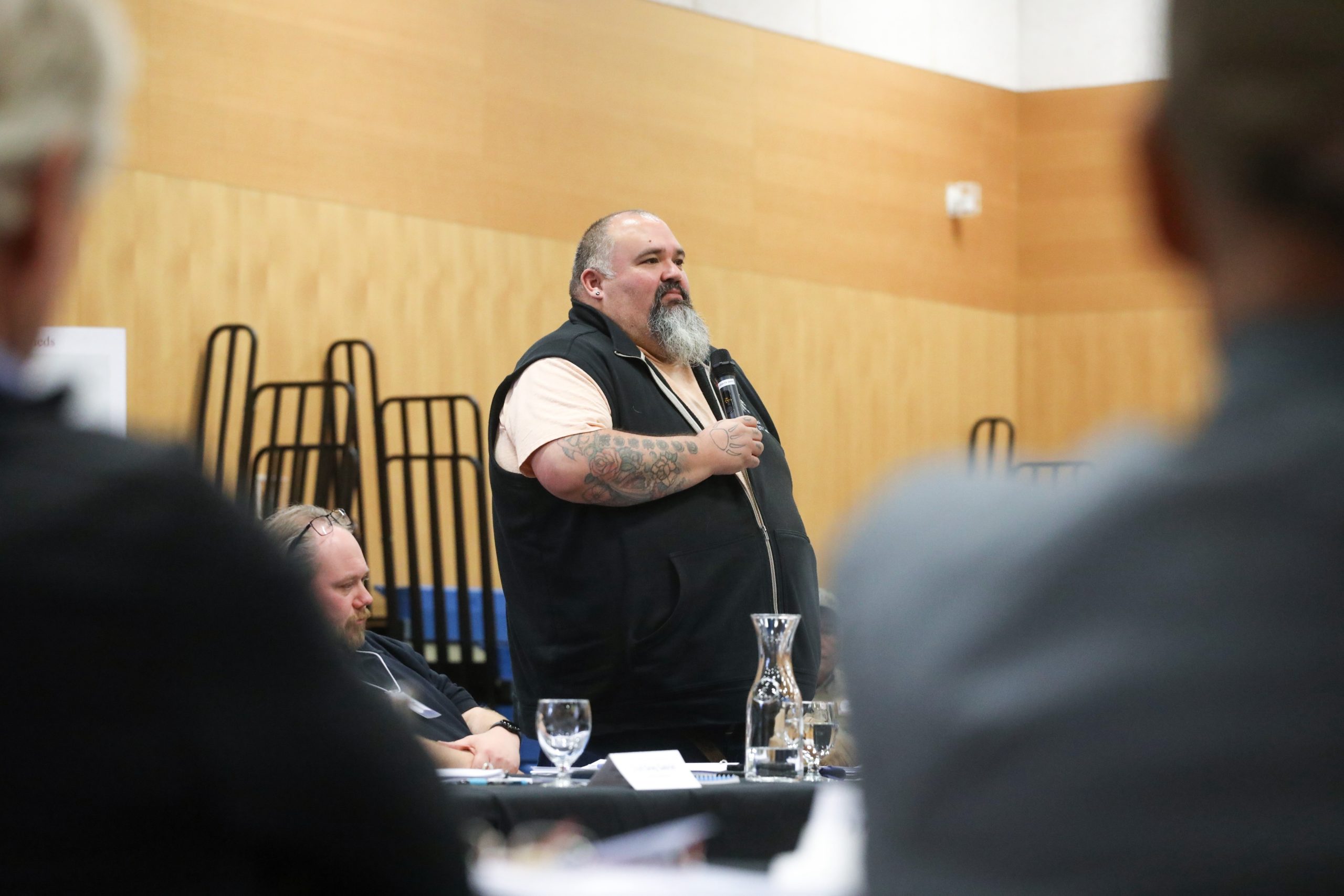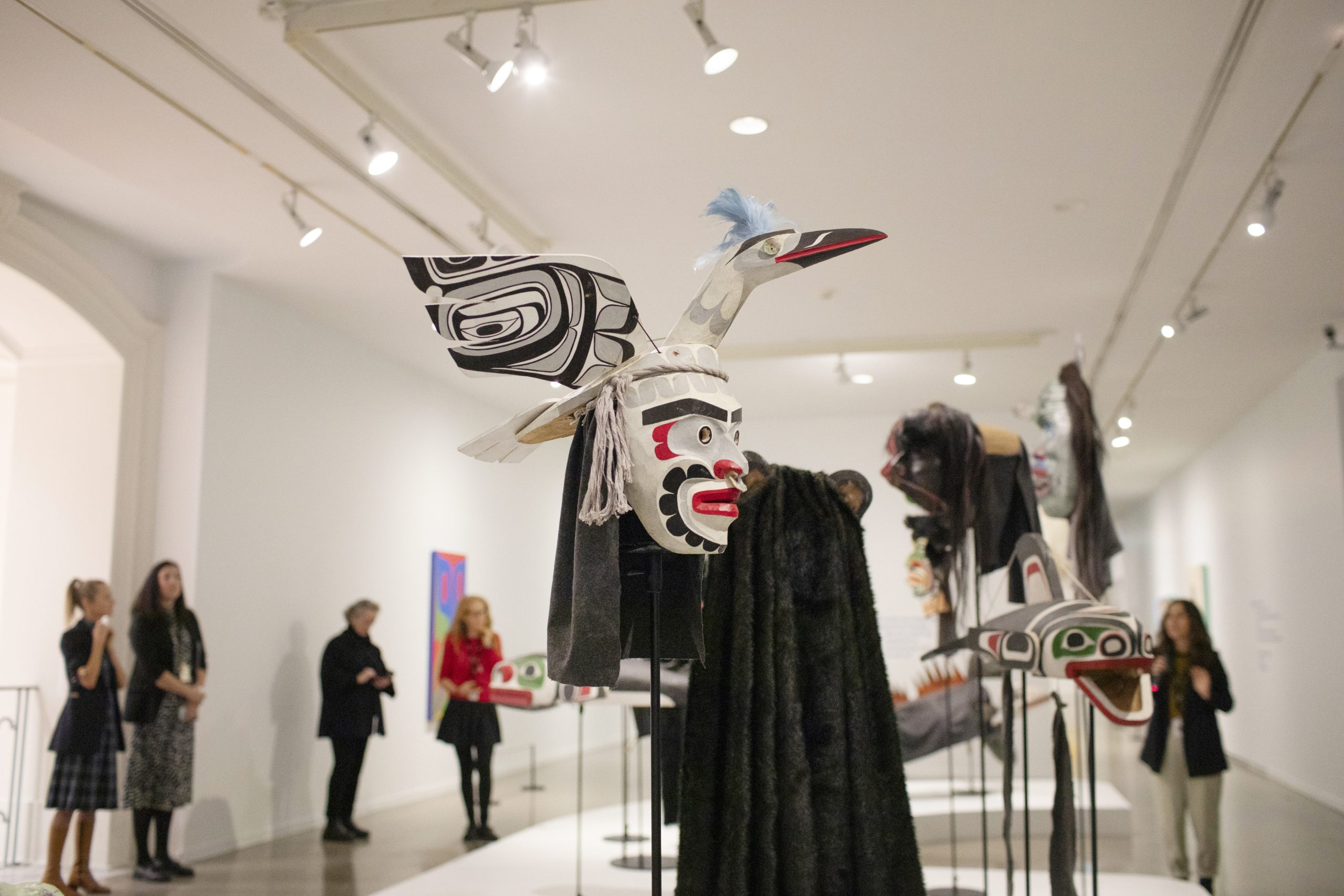After years of political unrest, Kwantlen members vote to oust chief of 3 decades
Nation holds a sƛ̓ənəq (general assembly) for the first time since 1993 — which could result in the toppling of its long-held government


With files from Danielle Paradis at APTN National News
After years of turmoil, people from the Kwantlen First Nation have voted to oust their chief during a sƛ̓ənəq (general assembly) which could ultimately topple the band’s long-held government.
On Nov. 27, band members gathered in a community church where they carried a motion to remove Chief Marilyn Gabriel, who has been at the helm of the 375-member nation for nearly 30 years.
Robert Thomas Jr., one of several hereditary chiefs, called for the sƛ̓ənəq — a convention allowed under their custom governance code — to vote on the future of the band’s leadership.
It’s the first time a general assembly of this nature has been held at Kwantlen since 1993, when band members first voted Gabriel in as the presiding hereditary chief with councillors Tumi Knott and Les Antone. Kwantlen member Fern Gabriel said at that event, there were verbal nominations and a vote which was conducted by a show of people raising their hands.
Robert Jago, a Kwantlen band member and journalist, has been researching the matter and said he interviewed Gabriel several years ago to understand the nation’s custom governance code.
“In 2019, I was able to get her to admit that there was no written governance. So, I drilled down into our history with her to figure out what our governance actually is, based on tradition,” said Jago.
“[Marilyn] said that the meeting was called by Robert Thomas Sr., he held it at the church, he opened it to a band members vote, they voted by hand, and they elected two council members.”
A rocky history under colonialism
The issue at Kwantlen, located on the outskirts of “Langley,” stems back several generations. Jago said the nation only started operating with its current hereditary chief system sometime in the 1980s.
He wrote about the nation’s current governance system in more detail in an essay for The Walrus several years ago, where he explained how the nation’s “hereditary custom,” where chiefs are inherited through bloodline, came to be — stemming from a band council resolution in 1989.
About two decades prior, the provincial Indigenous authority had instructed Kwantlen to elect a chief and two councillors for an “officially-recognized” government, Jago explained. Then-chief Alfred Gabriel Sr. then passed that role onto his son Joseph Gabriel. Members of the band launched a lawsuit back in 1991 claiming the band’s leadership was illegitimate.
“The dissidents who launched the court case stated that, for much of Kwantlen history, any decision affecting the nation — including the selection of chief — had always been arrived at by a quorum of band members,” Jago wrote.
“Now, under the formalized hereditary structure, they were angry that daily life — such as the disbursement of administrative monies and housing — was being overseen by a ruler and band council appointed by the chief for life.”
That 1991 lawsuit, Jago wrote, was apparently settled out of court in 1993, with a promise of a new vote for chief and council. That vote took place that same year at the general assembly where Joseph Gabriel’s daughter Marilyn Gabriel was voted in — however, the political dysfunction continued.
In 2019, a group of band members signed a petition calling for a new system of government and requested that Indigenous Services Canada (ISC) monitor the process of developing a new governance code. ISC declined to participate.
Information about resolutions from Marilyn Gabriel and the new councillors from the assembly were submitted to ISC on Nov. 28.
“Self-governing First Nations establish their own laws and policies in a broad range of matters for their communities and according to their cultures and traditions, including leadership selection,” said ISC spokesperson Matthew Gutsch.
“As with a community or custom leadership selection process, ISC is never involved in the election processes held by self-governing First Nations, nor will it interpret, decide on the validity of the process, or resolve election appeals. The department’s role is limited to recording the election results provided by the First Nation.”
Brandon Gabriel, a nephew of Marilyn Gabriel, said the unwritten custom governance code through ISC has resulted in abuses of power.
“Nothing is getting done on reserve, the band has made major changes to the band-run corporation without telling us, and there is no progress on any new bylaws, new housing — nothing,” Brandon Gabriel wrote in a statement to fellow members.
“But the main point is that it can and should be solved with talking, yet the chief and council refuse to talk.”
Forty minutes into the general assembly, 76-year-old Florence Thomas — who married into Kwantlen and has children, grandchildren and great-grandchildren from the nation — said that she has had a housing request ignored since 2003. She said she can only “pray” that one day her children will be able to live in their community.
“We did have a house in the Ruskin area, my son’s house burned down there and wasn’t rebuilt, my house had three different moulds and was condemned and never rebuilt,” said Thomas.
“(With) good leadership, you shouldn’t have to fear to ask questions, you shouldn’t have to fear to ask for what you need.”
In documents obtained by APTN from a survey sent out to Kwantlen members, people weighed in on what they thought was working in the nation, and what they would like to see improved. The survey responses, which are anonymous, were varied.
“They get a bad rep — they are great leadership compared to other FNs,” says one response.
“I think the current hereditary chief and council have done a good job in looking after the Kwantlen members but I think an elected chief and council might have more transparency with the Kwantlen members,” says another.
After two years of third-party mediation, responses indicated that more than 75 per cent of band members wanted democracy in some form. However, the former Kwantlen band council under Marilyn Gabriel stalled on bringing the new governance code to a vote. Gabriel currently has control of all banking and corporate information for the nation.
Things reached a boiling point in October when Marilyn Gabriel was accused of shoving an Elder — her sister — at an Elder’s Council meeting. The Langley RCMP was investigating but said the file is now closed with no evidence that an offence occurred.

Disputed governance
At the sƛ̓ənəq, about 20 per cent of band members turned out to vote on four resolutions based around transparency and accountability. They voted in three new council members — Brandon Gabriel, Christopher Thomas and Victor Back — to join the current two councillors. Band members joined the general assembly both in person and online, while some members voted by proxy.
However in a letter sent to Kwantlen members and shared on social media on Nov. 29, the current leadership dismissed the meeting and said that the hereditary custom chief and council did not call for it.
“We confirm that Kwantlen from time immemorial has carried out Coast Salish Ancestral Law for hereditary leadership … we confirmed that the resolutions are invalid,” said the statement signed by Marilyn and councillors Knott and Atone.
“Early next year, we will begin to engage community members to review the governance code. We intend to maintain our hereditary custom code, set standards, improve communications and engage Elders and community members in setting the community vision and priorities.”
Evan Duffy is the legal counsel representing the newly-voted-in councillors (Brandon Gabriel, Thomas and Back), and was tasked by them to arrange a smooth transition between Kwantlen governments in response to the statement released by Marilyn Gabriel, Knott, and Antone.
“There are a number of issues that we want to achieve immediately, the first being the dismissal of Kwantlen Chief Marilyn Gabriel, which the assembly overwhelmingly voted in favour of getting Marilyn Gabriel out from her position,” said Brandon Gabriel.
The next steps, he said, are to present a new governance code to Kwantlen band members this Wednesday and hold a referendum on the new governance code within 90 days. The terms of the five councillors would expire in 180 days or when a new band council under the new governance code is sworn in, whichever comes first.
Brandon Gabriel and Jago said they hope to keep a five-person elected council. As for the hereditary chiefship, there is a community consensus to have an expanded hereditary chiefship that would be responsible for diverse roles (spiritual, hunting, fishing, etc) that are symbolic and not related to governance.
Members elected from the assembly plan to meet in the coming weeks with nearby First Nations, as they seek to be recognized as Kwantlen’s legitimate government.
“We will move forward with our new governance reform agenda and welcome the new band council members to the government table,” said Brandon Gabriel.
Author
Latest Stories
-
‘Bring her home’: How Buffalo Woman was identified as Ashlee Shingoose
The Anishininew mother as been missing since 2022 — now, her family is one step closer to bringing her home as the Province of Manitoba vows to search for her
-
Tla’amin choreographer brings ‘Wild Man of the Woods’ ballet home to the West Coast
Cameron sinkʷə Fraser-Monroe is debuting his piece around ‘B.C.’ — but his sold-out show in his home territories feels particularly special












